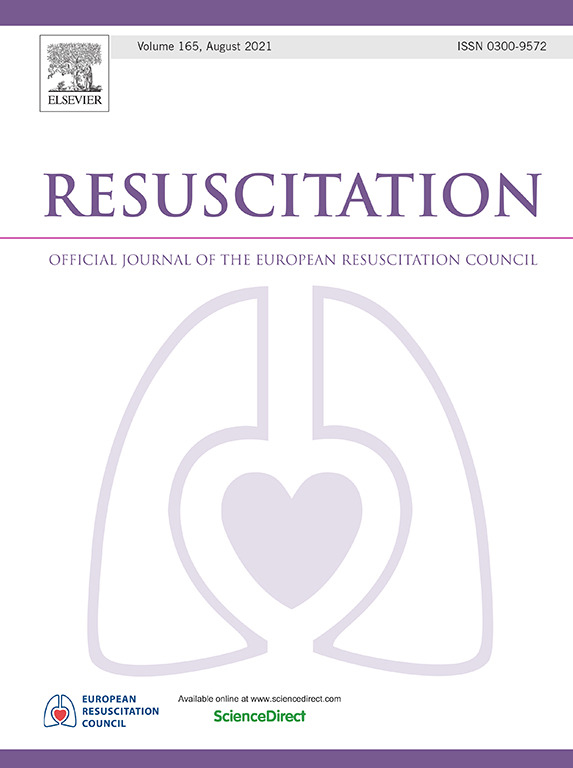Comparison of end tidal CO2 levels between automated head up and conventional cardiopulmonary resuscitation: A pre-post intervention trial
IF 6.5
1区 医学
Q1 CRITICAL CARE MEDICINE
引用次数: 0
Abstract
Background
The combination of controlled automated head/thorax elevation, active compression-decompression (ACD) cardiopulmonary resuscitation (CPR), and an impedance threshold device (ITD-16), termed AHUP-CPR, lowers intracranial pressure and increases circulation and neurologically-sound survival in pigs versus conventional (C) CPR. This study examined whether AHUP-CPR increased end tidal (ET) CO2, a non-invasive marker of cardiac output and organ perfusion, compared with C-CPR in witnessed out-of-hospital cardiac arrest patients.
Method
We conducted a prospective, single-arm, pre-post intervention trial in France between October 2019 and October 2022. Firefighters treated patients enrolled during the pre-intervention period with manual C-CPR and with AHUP-CPR during the post-intervention period. Advanced life support was provided by a physician-staffed 2nd-tier response vehicle for the two study periods. The primary outcome was the peak ETCO2 value measured during CPR.
Results
122 patients with a mean age of 67 years (standard deviation [SD], 17) were enrolled (59 in the pre-intervention period and 63 in the post-intervention period). Based on an intention-to-treat analysis, mean baseline ETCO2 values were comparable between pre- (20.1 mmHg, SD,16.3) and post-(19.2 mmHg, SD, 16.3) intervention periods. Mean peak ETCO2 values during CPR were 30.3 mmHg (SD, 13.1) versus 40.7 mmHg (SD, 17.8) for the pre- and post-intervention study periods (mean difference, 10.6, 95% confidence interval, 4.6 to 16.1, P < 0.001). Mean differences in peak ETCO2 between study periods did not vary according to the first recorded cardiac rhythm (P for interaction = 0.99). The proportion of return of spontaneous circulation [19 (32.2%) vs. 21 (33.3%)], survival on hospital admission [17 (28.8%) vs. 19 (30.2%)], and 30-day survival with favorable neurological outcome [8 (13.6%) vs. 7 (11.1%)] did not differ between study periods.
Conclusion
ETCO2 values during AHUP-CPR reached the range of non-arrest normal physiological levels and were significantly higher than with C-CPR, regardless of the presenting cardiac rhythm.
自动抬头与传统心肺复苏术的潮气末二氧化碳水平比较:前-后干预试验。
背景:与传统的心肺复苏(CPR)相比,可控的自动头胸抬高、主动加压-减压(ACD)心肺复苏(CPR)和阻抗阈值装置(ITD-16)的组合(AHUP-CPR)可降低猪的颅内压并增加循环和神经功能健全的存活率。本研究考察了与 C-CPR 相比,AHUP-CPR 是否能增加院外心脏骤停患者的潮气末二氧化碳(心输出量和器官灌注的无创标志物):我们于 2019 年 10 月至 2022 年 10 月期间在法国开展了一项前瞻性、单臂、干预前-干预后试验。消防员在干预前对入院患者进行人工 C-CPR 治疗,在干预后对入院患者进行 AHUP-CPR 治疗。在两个研究期间,由配备医生的二级响应车提供高级生命支持。主要结果是心肺复苏过程中测得的 ETCO2 峰值:122 名平均年龄为 67 岁(标准差 [SD],17)的患者参与了研究(干预前 59 人,干预后 63 人)。根据意向治疗分析,干预前(20.1 mmHg,标准差[SD]16.3)和干预后(19.2 mmHg,标准差[SD]16.3)的平均基线 ETCO2 值相当。心肺复苏期间的平均峰值 ETCO2 值在干预前和干预后研究期间分别为 30.3 mmHg(标清,13.1)和 40.7 mmHg(标清,17.8)(平均差异为 10.6,95% 置信区间为 4.6 至 16.1,研究期间的 P2 不随首次记录的心律而变化(交互作用的 P =.99)。自发循环恢复比例[19 (32.2%) vs. 21 (33.3%)]、入院存活率[17 (28.8%) vs. 19 (30.2%)]和30天神经功能良好存活率[8 (13.6%) vs. 7 (11.1%)]在不同研究期间没有差异:结论:无论出现何种心律,AHUP-CPR期间的ETCO2值都达到了非心搏骤停时的正常生理水平范围,并且明显高于C-CPR。
本文章由计算机程序翻译,如有差异,请以英文原文为准。
求助全文
约1分钟内获得全文
求助全文
来源期刊

Resuscitation
医学-急救医学
CiteScore
12.00
自引率
18.50%
发文量
556
审稿时长
21 days
期刊介绍:
Resuscitation is a monthly international and interdisciplinary medical journal. The papers published deal with the aetiology, pathophysiology and prevention of cardiac arrest, resuscitation training, clinical resuscitation, and experimental resuscitation research, although papers relating to animal studies will be published only if they are of exceptional interest and related directly to clinical cardiopulmonary resuscitation. Papers relating to trauma are published occasionally but the majority of these concern traumatic cardiac arrest.
 求助内容:
求助内容: 应助结果提醒方式:
应助结果提醒方式:


